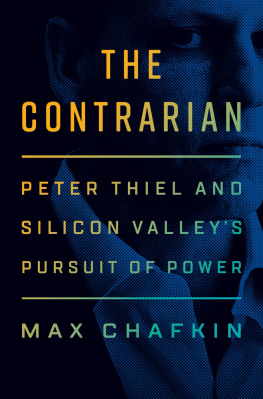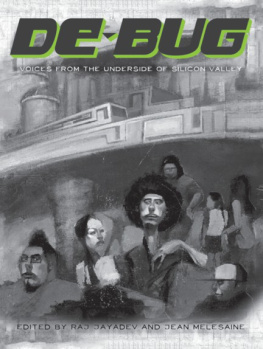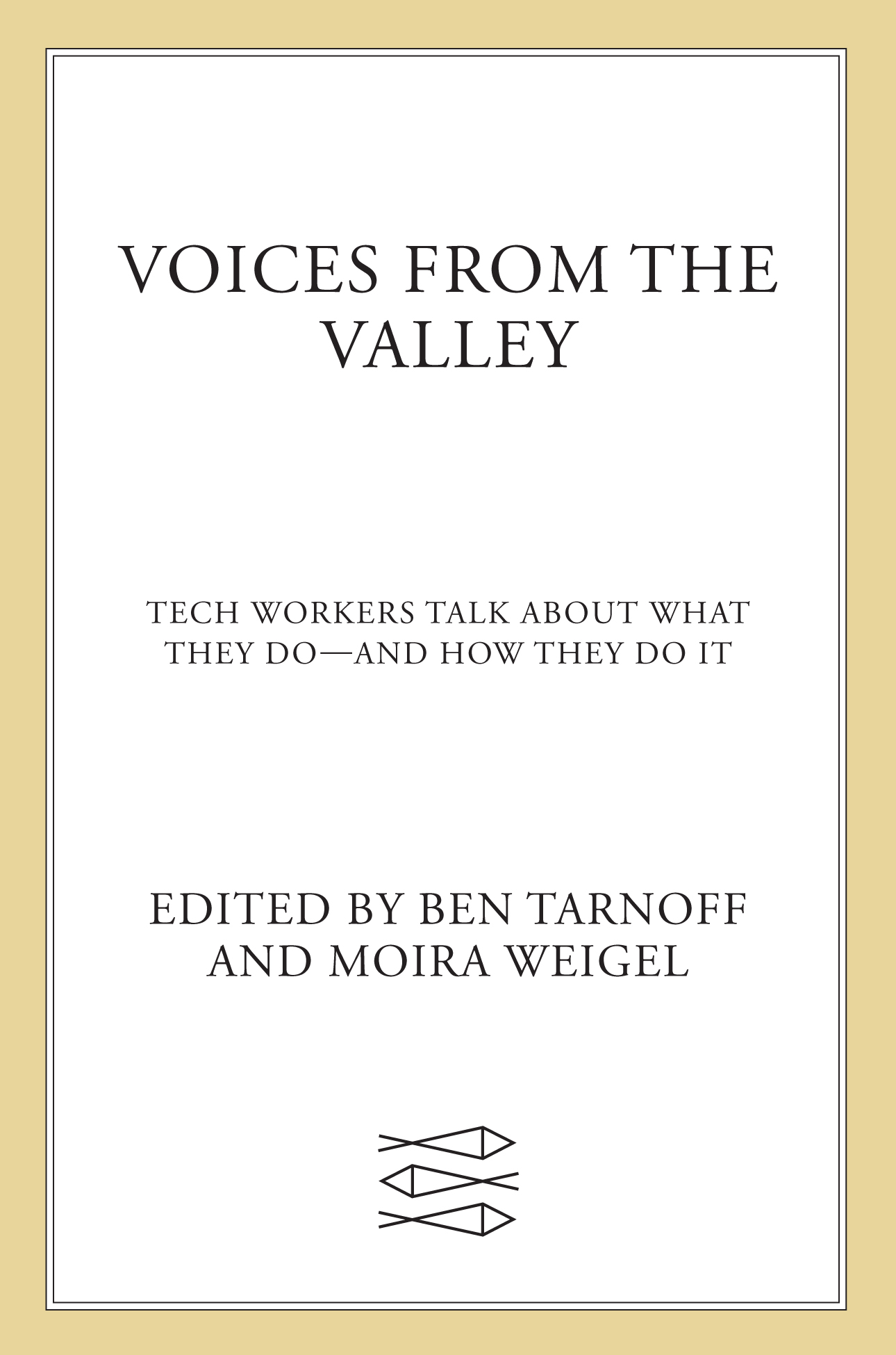The author and publisher have provided this e-book to you for your personal use only. You may not make this e-book publicly available in any way. Copyright infringement is against the law. If you believe the copy of this e-book you are reading infringes on the authors copyright, please notify the publisher at: us.macmillanusa.com/piracy.
This book is a tell-all about an open secret: platforms are made by people. For many people, it can be easy to miss.
There is the matter of word choice. Platform instead of publisher. AI instead of statistics. Tech companies have many reasons to speak as if their products run themselves.
To obscure the human work involved in training an algorithm or moderating a social media feed is both a sales pitch and an evasion. The pitch, for investors, is scale: a tech company will grow at superhuman speed. The evasion is of liability: a tech company will not be held responsible for what it breaks by moving this fast. For users, this is part of the promise, too: no gatekeepers, just a frictionless exchange of ideas, goods, and services. May the best meme win. Pay no attention to that man inside the black box!
This book will introduce you to the people behind the platforms. These are people whose work, in one way or another, shapes almost everything you dohow you find a job or a lover, get approved for a loan or flagged for a police stop, rave about a movie or fight about a president. In recent years, the power of the major tech companies has become impossible to ignore. For the first time, many politicians and pundits are attacking them as monopolies that inflict a wide range of harms on society, from promoting fake news and hate speech to eroding our privacy and attention spans. And as moments of conflict or crisis arise in some companies, dissidents and other malcontents have spoken up: leaking audio and screenshots, talking to reporters, walking out on the job. But it remains relatively rare to hear the ordinary people at those companies talk in ordinary ways about what they do. In this book theyll speak to you in their own words.
One set of voices you will hear belongs to techs most privileged caste: the full-time employees (FTEs). These are the people whom bestsellers mean when they ask, Are you smart enough to work at Google? They traverse the San Francisco Peninsula in company buses with tinted windows.
Their employers are notoriously secretive. Their offices sit behind many layers of security. A host of servicescafeterias, laundries, fitness studioskeep them on campus. Many of them went to school together; many of them date one another. Some of them get married.
The tightness of the social networks they inhabit imposes high costs on sharing anything with outsiders. In case these costs are not enough of a deterrent, the FTEs have also signed a nondisclosure agreement. For the purposes of this Agreement, confidential information includes all information that your employer treats with confidentiality. You cant enter an office of a major tech company without signing a promise to take any code you might see on a screen, diagram on a whiteboard, or slogan on a wall with you to the grave. BE OPEN, the walls of Facebook read.
Most tech companies pride themselves on the free flow of information among their employees. But they insist that it stay there. As a result, media coverage of tech has historically followed a few scripts. It was never hard to find gadget reviews or business reportingto figure out what to buy your stepdad for Christmas or how much a startup raised in its Series B. But journalists trying to tell a deeper story quickly ran into the wall of the NDA. There, they often found they had to make do with what industry PR gave them.
When it came to executives, founders, people at the top, what PR encouraged was hagiography. Many reporters took the bait: the paeans to Steve Jobs, who was pictured presenting the first iPhone in the posture of Leonardo da Vincis Salvator Mundi, were only the most on the nose. The fact that the people at the top were the only ones allowed to talk to the media reinforced the idea that they spoke for everyone.
When it came to the rank and file, it was hard to get anyone on record. Mostly, you heard whispers of extravagant and eccentric lifestyles: kombucha on tap at the campus cafeteria and kale at the pok bar, weekends spent microdosing before participating in meticulously planned orgies and other forms of rationalized libertinismtales from a smart-watch world in which the only taboo left was wasting time.
I want you to make our readers hate themselves, one magazine editor told a friend he had commissioned to write a story about the perks that tech companies were using to lure recruits.
Not long after, he left the magazine to go write copy for a tech company.
Not everyone in tech gets the perks, of course. In this book, in addition to FTEs, you will hear from another group of people: contractors. Historically, the media has ignored them. But the industry needs them to function.
This large and ever-shifting category includes people whose jobs have always been outsourced. They drive the shuttles with the tinted windows; they guard the entrance to HQ and cook the food and serve the coffee to keep the engineers working late. But increasingly, tech companies are also outsourcing what used to be full-time roles.
Many white-collar workers like recruiters and designers are now contractors, too. Elsewhere, invisible masses perform new kinds of digital piecework, like labeling data to train machine-learning algorithms or taking down videos that violate a platforms terms of service.
Contractors are a fast-growing percentage of the overall tech workforce: at Google, for instance, they constitute the majority. They often endure low wages and difficult working conditions. Nonetheless, many of them also take pride in their craft.
The tech industry places a premium on technical skills. But one recurring theme of our conversations is that all work involves technique, whether it is preparing steak for several hundred people or massaging bodies that hours of coding have turned into slabs of concrete.
The contractors in this book have some of the deepest insights into the tech industry and the deepest roots in the Bay Area. They remember the last bubblethe way it changed the landscape and their neighborhoods, the lavish lawns that newly minted millionaires planted and the friends who had to move away so that their homes could be demolished to make space for conference hotels.
Journalists and scholars are starting to pay more attention to more of the people who make up the tech industry. This book aims to give you a fuller picture of their lives, by letting them explain where they came from and why, what they do and what they still hope to do. It also shows how their lives intersect. This book aspires to be representative. It is not exhaustive. It could not be, because Silicon Valley is now everywhere.
Every city wants to have a tech hub. Silicon Beach, Silicon Alley, Silicon Hills, and Silicon Desertthese are ones you may have heard of. Countless other aspirants have not made it as far. But all over the world, politicians and businesspeople are trying to replicate the legendary ecosystem of Northern California. Silicon Valley has long seemed like the last refuge of the American dream.









